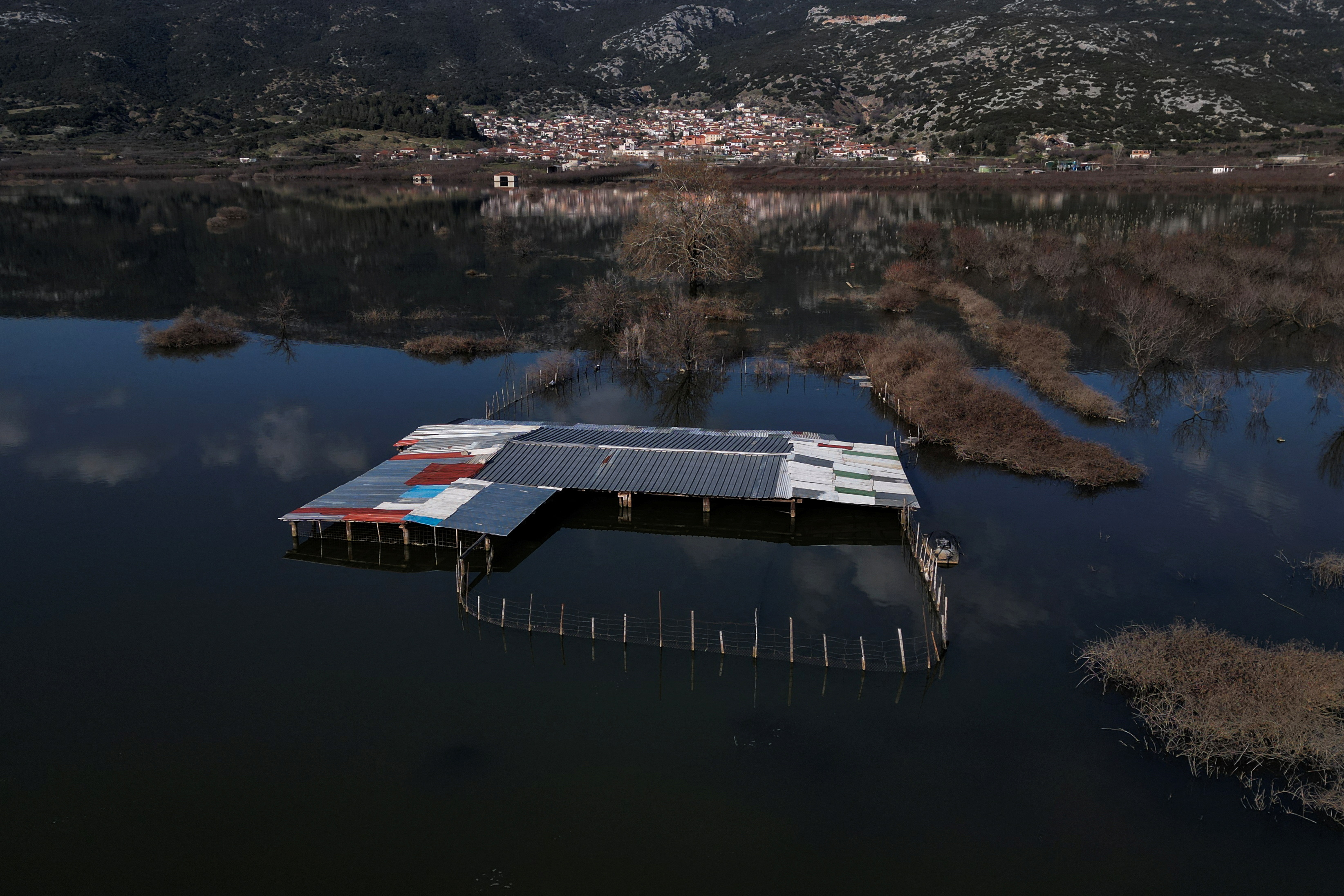Flooded Greek lake a warning to European farmers battling climate change

Sitting in a small motorboat, farmer Babis Evangelinos glides over land he once cultivated on the Thessaly plain in central Greece, the nearby trunks of his fruitless almond trees submerged by floodwater.
His small plot, near Lake Karla, is among tens of thousands of acres of cotton fields, almond trees and grazing lands that were wiped out by unprecedented flooding last year in one of Greece’s key breadbaskets.
Five months on, much of the area – and a lot of expensive equipment – remain underwater. A pumping station meant to stop flooding is marooned in a shallow lake. Pelicans and herons, previously uninterested in the once dry plain, swoop overhead.
“I could never have imagined I would have to board a boat to get to see my land,” said Evangelinos as he drifted by his sodden trees. “Work of a lifetime ruined, gone in three, four days of rain.”
The situation has fuelled anger among farmers who, like many across Europe, have found their livelihoods under threat from rising costs and climate change, and created a headache for governments expected to pay the bill.
Farmers from India to France and Poland have taken to the streets in recent days, bemoaning competition from abroad, a lack of government support and low prices. Thousands descended on central Athens on Tuesday calling for more aid.
Greece has been buffeted by extreme weather too. Wildfires ripped through the north last year, then Storm Daniel dumped 18 months of rain in four days in September, raising questions about the Mediterranean country’s ability to deal with an increasingly erratic climate. It also offers a warning of what other countries further north may face in future.
Daniel and another storm, Elias, flooded about 35,000 acres near Lake Karla in Thessaly plain, which accounts for 25% of Greece’s agricultural produce and 5% of GDP. Some 30,000 farmers were impacted across the province.

Lake Karla had been drained in the 1960s to increase farmland and a small part of it was recovered in recent years, only for 450-500 million cubic metres of water to rush back in during the floods. The area near the Lake has a small man-made outlet, and HVA, a Dutch agricultural company hired by the government to assess the damage, said it could take up to two years for the water to subside.
Evangelinos had just picked a one-tonne batch of almonds before the rain came and washed it away. He would normally expect 10 tonnes over the season, about 20,000 euros worth, but managed just 40% of that. Now he is not sure how he will pay for his two daughters’ university expenses.
“It’s very sad. Because those trees you see now being 20 and 30 years old, you grow them out of a small branch.”
Farmers’ struggle
Responding to farmers’ protests over rising costs, Greece’s government has offered discounts on power bills and extended a tax rebate for diesel. It’s not clear if the government, cash-strapped after a decade-long financial crisis, will offer more.
In Thessaly, farmers have so far received 150 million euros ($162 million) in compensation for the flooding. The government said another 110 million euros will come in July.
Many say they want more. Farmers from near Lake Karla attended Wednesday’s protests in Athens. One tractor parked in the central square bore a placard that read: “Karla. 180,000 stremmas underwater,” referring to a land measurement used in Greece. “We want our fields back.”
Local authorities have proposed speeding up the recovery by using floating machines to pump out the water as early as April in one area, said Thessaly governor Dimitris Kouretas.
“There are several thousands of families living here. Do we want them to go?” he said.
Some already have.
Vangelis Peristeropoulos, 35, a father of two, lost nearly all his 640 pigs and sheep in Stefanovikeio, another town near the lake. He took a job as a truck driver at the port city of Volos in November to make ends meet.
“When we saw the catastrophe and that there was nothing we could do, we looked for another job because expenses kept running.”
Evangelinos is staying put for now. He says once the soil dries out, experts will have to analyse it and make sure it is fit for cultivation. He hopes to uproot damaged trees and plant new ones.
“What I want is to set foot on the muddy land and start cultivating all over again.”
[Reuters]





